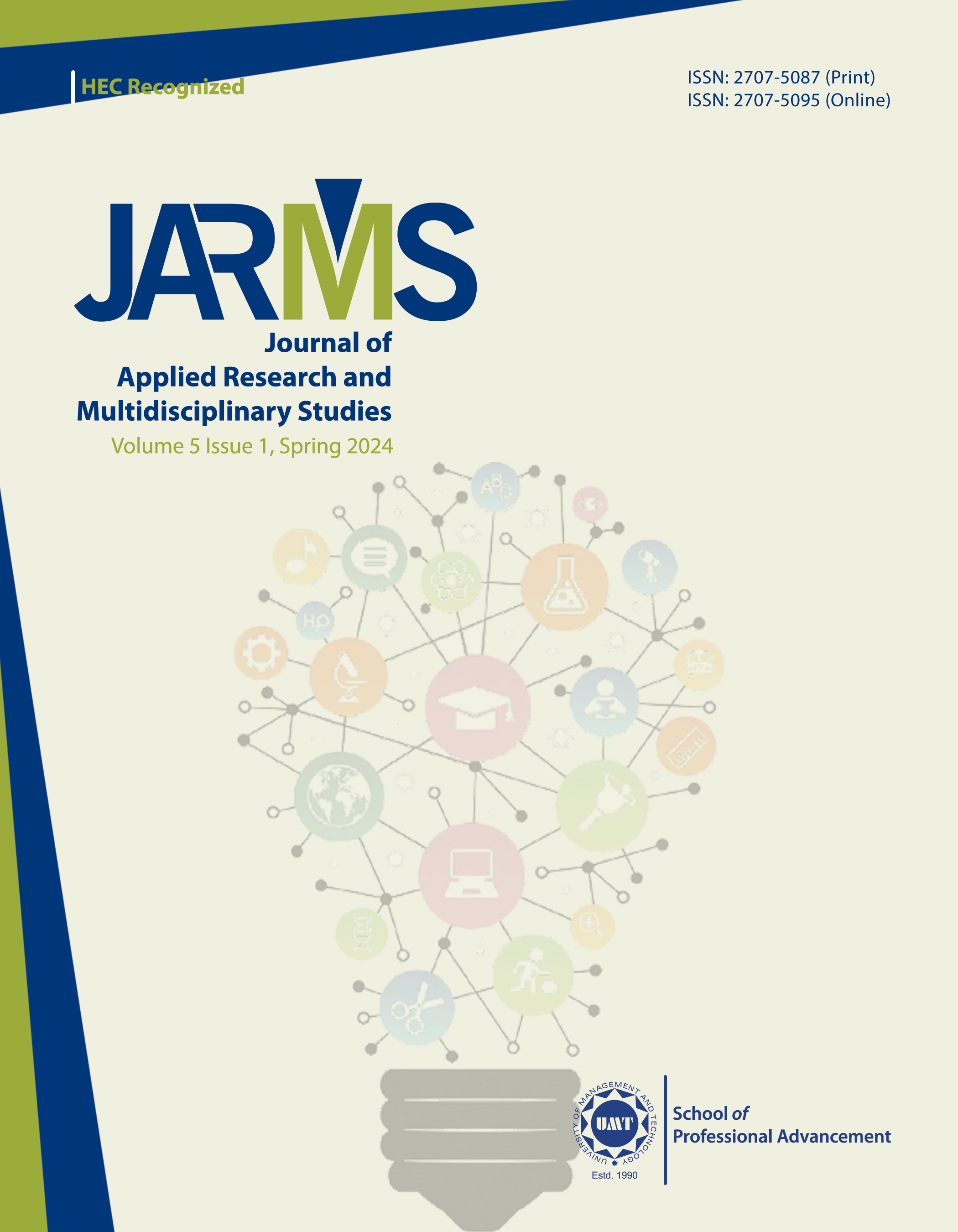Married but Lonely: Attachment Styles and Loneliness across Newly Wedded and Long Wedded Pakistani Women
Abstract
 Abstract Views: 0
Abstract Views: 0
This research examines the relationship between attachment styles (secure, avoidant, and anxious attachment styles) and loneliness among married women. The study hypothesized that attachment styles would likely predict loneliness and there would be a difference in level of loneliness due to the nature of marriage (arranged or love). Correlational research design was used to conduct the research. Non-probability sampling strategy was used to collect data from 130 married women, age ranging from 25-50 years (M=31; SD=6.4). Self-constructed demographic sheet, Adult Attachment Scale (Collins & Read, 1990) and UCLA Loneliness Version 3 (Russell, 1996) were used to collect data. Results revealed that loneliness was negatively correlated with secure and avoidant attachment styles, while positively correlated with anxious attachment style among married women. Furthermore, duration of marriage moderated the relationship between avoidant attachment style and loneliness. The findings further revealed that women's levels of loneliness were not influenced by the nature of marriage, whether it is arranged or love. Conclusively, this study has implications for mothers, therapists, and counselors.
Downloads
References
Achterbergh, L., Pitman, A., Birken, M., Pearce, E., Sno, H., & Johnson, S. (2020). The experience of loneliness among young people with depression: A qualitative meta-synthesis of the literature. BMC Psychiatry, 20(1), Article e415 https://doi.org/10.1186/s12888-020-02818-3
Ainsworth, M. D. (1973). Infant–mother attachment. American Psychologist, 34(10), 932–937. https://doi.org/10.1037/0003-066X.34.10.932
Borawski, D., Sojda, M., Rychlewska, K., & Wajs, T. (2022). Attached but lonely: Emotional intelligence as a mediator and moderator between attachment styles and loneliness. International Journal of Environmental Research and Public Health, 19(22), Article e14831. https://doi.org/10.3390/ijerph192214831
Cacioppo, J. T., Hawkley, L. C., & Berntson, G. G. (2003). The anatomy of loneliness. Current Directions in Psychological Science, 12(3), 71–74. https://doi.org/10.1111/1467-8721.01232
Collins, N. L., & Read, S. J. (1990). Adult attachment, working models, and relationship quality in dating couples. Journal of Personality and Social Psychology, 58(4), 644–663.
DiTommaso, E., & Spinner, B. (1997). Social and emotional loneliness: A re-examination of Weiss' typology of loneliness. Personality and Individual Differences, 22(3), 417–427. https://doi.org/10.1016/S0191-8869(96)00204-8
Dunbar, R. I. (2014). The social brain. Current Directions in Psychological Science, 23(2), 109–114. https://doi.org/10.1177/0963721413517118
Ernst, J. M., & Cacioppo, J. T. (1999). Lonely hearts: Psychological perspectives on loneliness. Applied and Preventive Psychology, 8(1), 1–22. https://doi.org/10.1016/S0962- 1849(99)80008-0
Flicker, S. M., Sancier‐Barbosa, F., Afroz, F., Saif, S. N., & Mohsin, F. (2020). Marital quality in arranged and couple‐initiated marriages: The role of perceived influence over partner selection. International Journal of Psychology, 55(4), 629–637. https://doi.org/10.1002/ijop.12622
Halat, M. I., & Hovardaoğlu, S. (2010). The relations between the attachment styles, causality and responsibility attributions and loneliness of the married couples in the context of the investment model. Procedia - Social and Behavioral Sciences, 5, 2332–2337. https://doi.org/10.1016/j.sbspro.2010.07.459
Hawkley, L. C., Browne, M. W., & Cacioppo, J. T. (2005). How can I connect with thee? Let me count the ways. Psychological Science, 16(10), 798–804. https://doi.org/10.1111/j.14679280.2005.01617.x
Hsieh, N., & Hawkley, L. (2018). Loneliness in the older adult marriage: Associations with dyadic aversion, indifference, and ambivalence. Journal of Social and Personal Relationships, 35(10), 1319–1339. https://doi.org/10.1177/0265407517712480
Jalilian, K., Momeni, K., & Jebraeili, H. (2023). The mediating role of early maladaptive schemas in the relationship between attachment styles and loneliness. BMC Psychology, 11(1), Article e136. https://doi.org/10.21203/rs.3.rs-2391389/v1
Justin, M., & Haroon, Z. (2019). Attachment styles and marital satisfaction among young people. Journal of Research & Reviews in Social Sciences Pakistan, 2(1), 366–378.
Keller, F. M., Derksen, C., Kötting, L., Dahmen, A., & Lippke, S. (2022). Distress, loneliness, and mental health during the COVID‐19 pandemic: Test of the extension of the evolutionary theory of loneliness. Applied Psychology: Health and Well-Being, 15(1), 24–48. https://doi.org/10.1111/aphw.12352
Kiralp, F. S. S., & Serin, N. B. (2017). A study of students’ loneliness levels and their attachment styles. Journal of Education and Training Studies, 5(7), 37–45. https://doi.org/10.11114/jets.v5i7.2395
Kornaszewska-Polak, M. (2016). Subjective loneliness, well-being and marital satisfaction in couples with different attachment styles. Polskie Forum Psychologiczne, 21(4), 514–533. https://doi.org/10.14656/PFP20160402
Nottage, M. K., Oei, N. Y. L., Wolters, N., Klein, A., Van der Heijde, C. M., Vonk, P., Wiers, R. W., & Koelen, J. (2022). Loneliness mediates the association between insecure attachment and mental health among university students. Personality and Individual Differences, 185, Article e111233. https://doi.org/10.1016/j.paid.2021.111233
Rashid, K. (2024, April 14). The rate of divorce has increased by 35 per cent during the past five years. The Express Tribune. https://tribune.com.pk/story/2462573/the-rate-of-divorce-has- increased-by-35-per-cent-during-the-past-five-years
Russell, D. W. (1996). UCLA loneliness scale (version 3): Reliability, validity, and factor structure. Journal of Personality Assessment, 66(1), 20–40. https://doi.org/10.1207/s15327752jpa6601_2
Shafique, A., Yousaf, K., & Irfan, A. (2023). Marital satisfaction and quality of life among married women: Moderating role of attachment styles. Bahria Journal of Professional Psychology, 22(2), 27–42. https://doi.org/10.58800/oglm4067
Shorter, P., Turner, K., & Mueller-Coyne, J. (2022). Attachment style’s impact on loneliness and the motivations to use social media. Computers in Human Behavior Reports, 7, Article e100212. https://doi.org/10.1016/j.chbr.2022.100212
Spence, R., Jacobs, C., & Bifulco, A. (2020). Attachment style, loneliness and depression in older age women. Aging & Mental Health, 24(5), 837–839. https://doi.org/10.1080/13607863.2018.1553141
Swapnil, S., & Sahai, A. (2023). Effect of loneliness on attachment styles in young adults during pandemic. The International Journal of Indian Psychology, 9(3), 1683–1692. https://doi.org/10.25215/0903.158 .
Weiss, R. S. (1973). The experience of emotional and social isolation. MIT Press.
White, S. D. (2019, July 12). The 3 types of loneliness and how to combat them. Psychology Today. https://www.psychologytoday.com/us/blog/lifetime-connections/201907/the-3-types- loneliness-and-how-combat-them
Copyright (c) 2024 Amna Shafique, Zoya Sajid, Kainaat Yousaf, Hafiza Rizwana Imdad

This work is licensed under a Creative Commons Attribution 4.0 International License.



